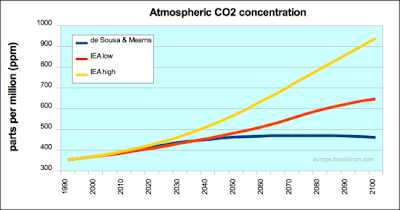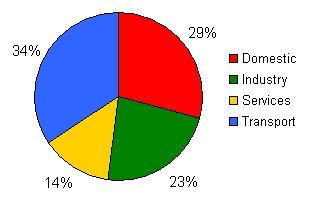I know I said I wasn’t going to post anything further about AGW – and, really, this isn’t – at least not in the same way. For the purposes of this post I’m going to assume that the mainstream consensus (ie disregarding the extremist forecasts) is basically true, and, in particular, that the models have some connection to reality.

Click ‘full post’ for text.
The first point is to do with the amount of fossil fuel resources available, and the way in which the IPCC overestimates how much there is. I’ve linked to these articles before, but as I suspect the links are often not followed I’m going to set out some of the key claims. (The graph above is taken from this post which is one of the key ones).
The point is a simple one: the IPCC, in their reference scenarios, use estimates of the availability of fossil fuel derived from the IEA which are seriously implausible. The most recent article spelling out why is here. I quote: “Our conclusion is that the assumptions of coal use that the IPCC recommended that climate researchers refer to in calculating their future horror scenarios are completely unrealistic. The question is why at all these gigantic volumes of carbon dioxide emission are to be found among the possible scenarios. The IPCC bears a great responsibility for the fact that thousands of climate researchers around the world have dedicated years of research to calculating temperature increases for scenarios that are completely unrealistic. The consequence is that very large research resources have been wasted to little benefit for us all.” Aleklett points out that the burning of even as much coal as there is is unlikely, due to the political context (Montana in the US) and the lack of local need (Siberia).
The second point is the one underlying the graph above: if human society continues to burn all the fossil fuels that are available, ie including Montana and Siberia, until they are economically exhausted (ie the net return on energy is close to 1:1) then carbon dioxide in the atmosphere will peak at around 480ppm in the second half of the twenty-first century. According to the MAGICC model used at the Oil Drum, this translates into around 1.7ºC above 1990 levels.
The third point that I would make is that ceteris paribus makes morons of us all. The human economic system is dynamic, and, especially in the more free-market oriented societies, there is room to respond to changed circumstances. What I take this to mean is that a) peak oil and associated limits will cause havoc to our economies well in advance of our accessing all the coal, b) the truth of the Limits to Growth perspective will by then be unavoidable for all except the most wilfully obtuse, c) we will as a human community either shift towards sustainable habits of life or we will slaughter ourselves fighting for what is left – in either case the coal will not be accessed.
Which makes me think that the rather extravagant boondoggle proposed in Copenhagen was somewhat besides the point. Moreover, I can’t help but feel that the doom and gloom being put about is counterproductive. It is as if the Victorian clerical cliche of ‘You’re going to burn in hell’ has been resurrected in a green dress; it turned people away then and it is turning people away now. The truth is that we are not in control of the system (any complex system) and we need to leave room for God to be God, and to avoid continuing the intellectual, scientistic and technocratic hubris that drove us into this mess in the first place.
What we need to do is to prepare for the great dislocation. Over the next ten to fifteen years we are going to be jettisoned from the sinking luxury liner and we need to get ready for a much simpler existence in the lifeboat. We need to ask ourselves what is worth saving from our present cornucopia, and work to save what we can. Doing that properly requires rather more prayer and listening to God than is presently in display. I am more and more persuaded that it also requires the adoption of a Ninevite attitude if the lifeboats in their turn are not to sink.
I’ll write something more about the nature of these choices in due course.











